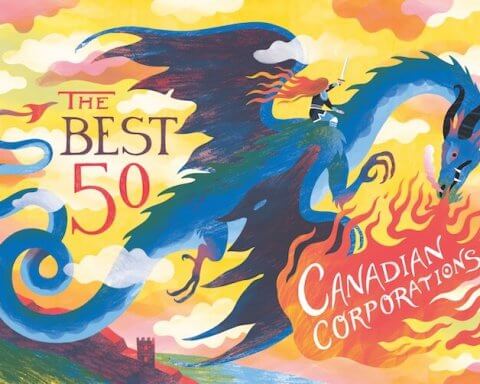The Co-operators Group, an insurance and financial services organization, is expected to operate differently than many of its financial services peers. The company’s cooperative business model means that profit has to be balanced with the needs of its clients and community. That’s a responsibility the Guelph, Ont.-based company does not take lightly as it tries to boost the sustainability performance of its operations and many of its products and services. For example, the Co-operators was the first insurer to offer water damage coverage in Canada’s most vulnerable areas as well as storm surge coverage in coastal ones providing some protection to people whose homes are standing in the path of increasing climate chaos. The company also provides generous employee benefits such as a mental health package for families in need.
“We exist to provide financial security for Canadians and Canadian communities,” says president and CEO Rob Wesseling. “And we take a holistic view. It’s not just financial security in terms of economics, but also social and environmental security which are critical to overall wellness.”
It’s this strategy, and the results to date, that earned the Co-operators the top spot on the 2019 Corporate Knights Best 50 Corporate Citizens in Canada. The Co-operators was 12th on the list in 2018 and earned the top spot in 2011. The organization also ranked number one in 2019 against 230 of its global insurance peer companies.
The Co-operators, founded in 1945, has more than $41 billion in assets under administration and four main lines of business: property and casualty insurance, life insurance, institutional asset management and brokerage operations. It employs 5,350 people including 2,753 licensed insurance representatives across Canada and it serves more than 5.7 million members within 250 credit unions. Its investment division includes asset management for 156 institutions including pensions, insurance companies, co-operatives, endowments and foundations.
The Co-operators has been on a “deliberate journey to sustainability” over the past decade, says Barbara Turley-McIntyre, vice president, sustainability and citizenship. “There is no destination. The goal posts keep moving and we continue the journey with it.” Turley-McIntyre says the company has been successful in part because it has engaged the entire organization, from the boardroom to front-line employees, to help meet its sustainability goals. “It’s not an add on,” she says, “it’s truly embedded.”
Clean Revenue Rewarded
In the Corporate Knights ranking, the company scored high under “clean revenue,” which is revenue that has a clear environmental or social benefit with 11% of its insurance premiums linked to sustainability themes. Its Comprehensive Water insurance product was created in 2015 and provides a wide range of water and flood damage coverage. In 2018, the Co-operators extended that same policy coverage to include damage caused by storm surges. More than 300,000 of its Canadian clients have this insurance coverage today. “It’s a piece of the market that has evolved,” says Wesseling. “While we can’t take credit for the evolution of the market in its entirety, we do think we played an important role as the catalyst, in terms of highlighting the issue and creating circumstances where the market can emerge.”
 According to Wesseling, approximately 13% of the organization’s institutional assets, or more than $1.2 billion, are in “verifiable impact investments.” That’s up from just under 8% in 2017. The organization is aiming for 20% by the end of 2022. “We’re not done yet,” he says.
According to Wesseling, approximately 13% of the organization’s institutional assets, or more than $1.2 billion, are in “verifiable impact investments.” That’s up from just under 8% in 2017. The organization is aiming for 20% by the end of 2022. “We’re not done yet,” he says.
In 2017, the organization’s investment management company, Addenda Capital, launched the Addenda Capital Impact Fixed Income Pooled Fund, the first of its kind in Canada, which includes about $50 million in investments today. In addition, Addenda Capital manages more than $2.5 billion in impact investments, of which 48% are investments from the Co-operators.
“It took time and there was pressure and resistance, internally and externally, as to whether making a positive impact with your investment portfolio was really something that could deliver on the other goals we have as an organization,” says Wesseling. He says the Co-operators is always looking for ways to capitalize on the growing number of impact investments on the market while also supporting the development of the green bond market.
Employee Impacts
The Co-operators scored well in terms of employee turnover and retention. Its employee retention rate was 94% in 2018 and 2017, which it says outperformed the Conference Board of Canada’s 88% benchmark for the sector. Its voluntary turnover rate was 4.6% in 2018, versus 3.6% the previous year, and below the Conference Board benchmark of 8%. “It’s the purpose and the work environment that, in our view, drives the high level of engagement and commitment in the organization, which in turn drives high retention levels,” says Wesseling.
The organization invests an average of $1,029 per employee annually on external education programs and offers an attractive benefits package. Last year, it increased its mental health benefits package to $5,000 from $500 per beneficiary. The package includes support for employees and their immediate family members and includes services ranging from counselling to addiction support services. Wesseling says the change reflects the prevalence of mental health issues and is a way to support employees who may be suffering. “We believe in rewarding our people and ensuring that they have the salary and benefits they need to sustain themselves and their families,” says Wesseling.
Overall, the Co-operators is focused on improving its sustainability performance in areas that matter to its stakeholders, and recommends other organizations do the same. “If we aren’t focused on these issues then we are likely to miss some of the risk cues associated with some of the impacts on our business,” says Wesseling. “These issues are important to every community. If they are important to every community then they should be important to every business serving those communities. At the end of the day, members and clients will decide which businesses to patronize. And more and more, he says, “It will be those whose purpose and activities align with their values.”
Brenda Bouw is a freelance writer and editor with more than 20 years of experience as a business reporter.
Click here to go back to the 2019 Best 50 landing page.







